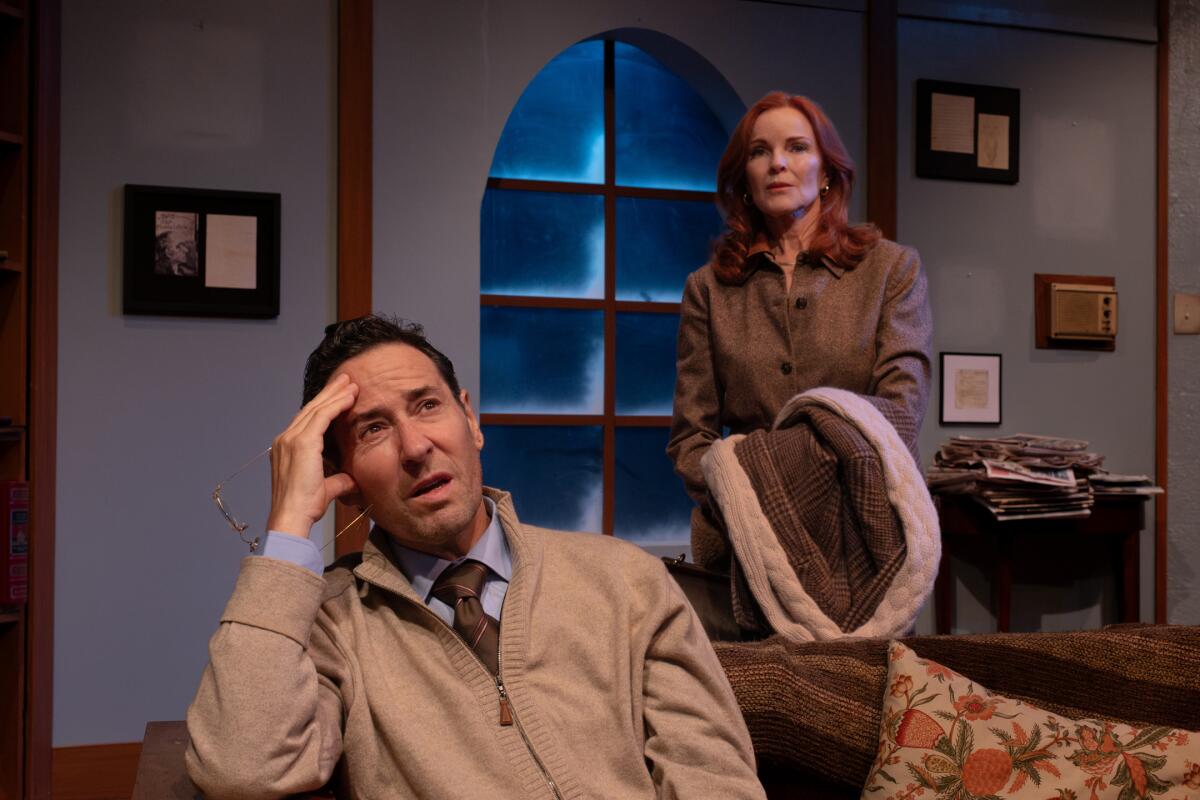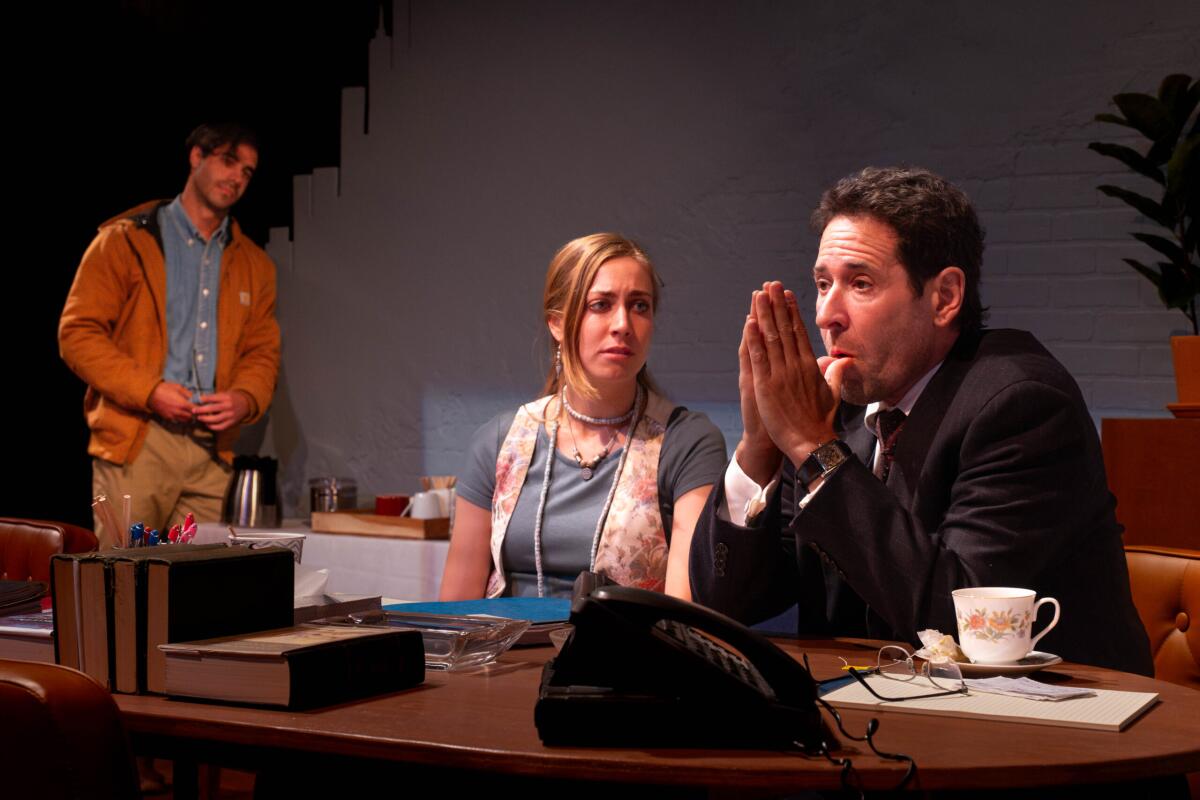Review: Rob Morrow and Marcia Cross relight ‘The Substance of Fire’ in uneven production

- Share via
Isaac Geldhart, the imperious protagonist of Jon Robin Baitz’s “The Substance of Fire,” is waging a losing battle against the forces of cultural barbarism.
As cruelly condescending as he is intellectually discerning, the character left a lasting impression when he appeared onstage at Playwrights Horizons in 1991. His gimlet-eyed observations and mordant humor announced the arrival of a playwright with something to say and the fiery eloquence with which to say it.
A refugee from Hitler’s Europe, Isaac has presided over his family-owned New York publishing house with little regard for the profit motive. Unconcerned with bestseller lists, he would rather publish a glossary of colloquial Anglo-Indian words and phrases or a six-volume treatise on Nazi medical experiments than a hip new novel that his son Aaron believes can turn around the company’s dire finances.
The first part of “The Substance of Fire,” in a revival at Ruskin Group Theatre in Santa Monica, takes place in a conference room at Kreeger/Geldhart Publishers. The year is 1987, and Aaron (Emmitt Butler) has summoned his two siblings, Martin (Barret T. Lewis), a landscape architect who teaches at Vassar College, and Sarah (Fiona Dorn), an actor on an indie children’s television program who has flown in from L.A., to urge Isaac (Rob Morrow) to listen to business reason.
The King Lear of book publishers, Isaac isn’t prepared to bend to the will of his children. After Martin backs Aaron by offering him his shares of the company, Sarah tentatively comes to her father’s defense by offering Isaac her own. A mini succession drama unfolds, but like the HBO series on the subject, it’s impossible to separate corporate one-upmanship from family dysfunction.
The second half of the play, set 3½ years later in 1991, moves the action to Isaac’s Gramercy Park apartment, where the patriarch, in exile since Aaron’s successful takeover, is still trying to regain the upper hand despite the steep decline in his physical and cognitive health. Martin, loyal despite his father’s dismissal of him as a “gardener’s apprentice,” has arrived to facilitate Isaac’s tense meeting with a psychiatric social worker (played by a refreshingly assured Marcia Cross), who has been sent to evaluate his ability to live independently.

Plot-wise, “The Substance of Fire” reveals a playwright still mastering his craft. But as a character study, with Holocaust themes deepening the stakes of the domestic turmoil, the play holds up extremely well in its critique of a world that has lost its capacity for silence and that is prepared to sacrifice literature for meretricious distraction.
Director Mike Reilly does a lucid job of sorting out the play’s diptych structure. The second half, safely in the veteran hands of Morrow (“Northern Exposure”) and Cross (“Desperate Housewives”), helps clarify the continuity of Isaac’s post-traumatic journey. The play may seem like two one-acts soldered together, but there is a discernible throughline.
A casting problem, however, hampers the production from the start. The actors playing Isaac’s children seem so removed from the play’s milieu that Baitz’s extravagant language tends to die in their mouths.
Compounding the issue, the dreary shoestring sets fail to conjure the literary ambience that Isaac is fighting a rearguard action to preserve. The younger ensemble members seem to have wandered in from a 21st century culture unimaginable to the play’s high-minded patriarch.
Fortunately, “The Substance of Fire” belongs to Isaac. And Morrow, who has a long history with the play, having played Aaron in an early Naked Angels workshop production and in the Long Wharf Theatre 1990 world premiere, supplies a welcome note of somber gravity. His Isaac may be more modest than the character portrayed so memorably by Ron Rifkin in the New York premiere, at the Mark Taper Forum and in the 1996 Daniel Sullivan film. But Morrow’s quiet intensity, which doesn’t soft-pedal Isaac’s arrogance and belligerence, has a haunting quality.
The humanity of his character, concealed in his early filial interactions, will not be denied. When Cross’ Marge shares a few details of her own tragic marriage to a corrupt politician, Morrow’s Isaac responds in a way that sets in motion a thaw in the heart of a man who found survival in literature but at a cost he’s just beginning to understand.
This Ruskin Group Theatre production may not do full justice to Baitz’s drama, but how welcome it is to reencounter this playwright just as he’s discovering his own voice through the contradictions and critical sharpness of a protagonist who knows the value of fighting a losing battle.
‘The Substance of Fire’
Where: Ruskin Group Theatre, 3000 Airport Ave., Santa Monica
When: 8 p.m. Fridays, Saturdays, 2 p.m. Sundays, through Sept. 1
Cost: $25-$40
Info: ruskingrouptheatre.com or (310) 397-3244
Running time: 2 hours, including one intermission
More to Read
The biggest entertainment stories
Get our big stories about Hollywood, film, television, music, arts, culture and more right in your inbox as soon as they publish.
You may occasionally receive promotional content from the Los Angeles Times.











